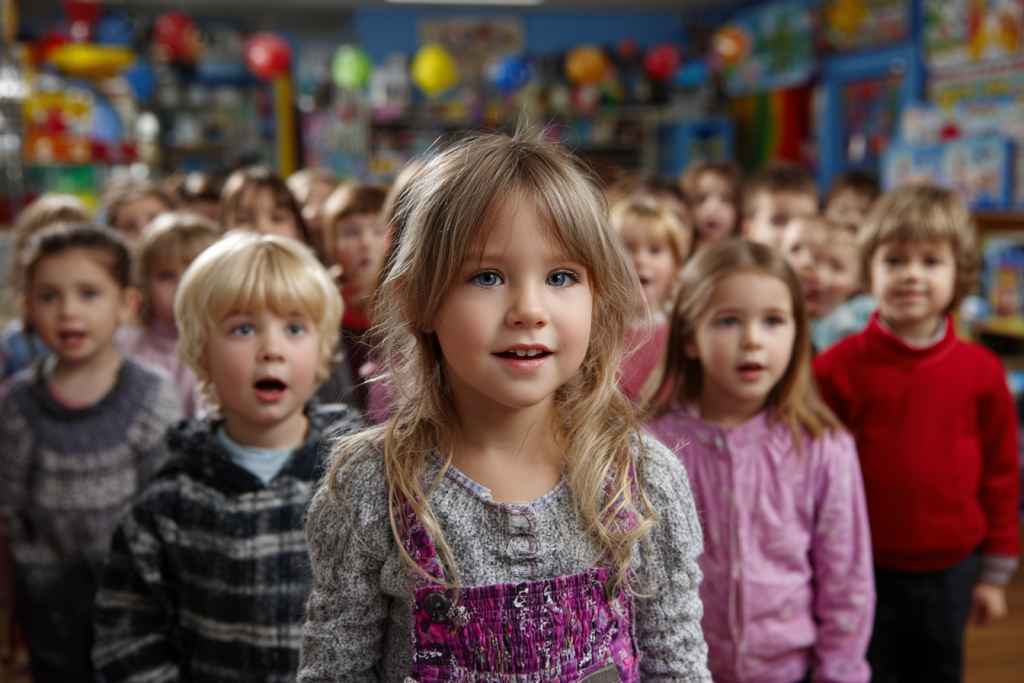As parents and educators, we instinctively know that music holds a special place in a child’s world. From the gentle lullabies that soothe a newborn to the upbeat songs that inspire a toddler to dance, music is woven into the fabric of early childhood. But beyond its ability to comfort and entertain, a growing body of scientific research is revealing a profound truth: music is a powerful catalyst for brain development. This isn’t just about creating future musicians; it’s about building a strong foundation for lifelong learning. The rhythm and melody of a song can quite literally wire a child’s brain for success, laying the groundwork for language, math, and emotional intelligence. At Discovery Time Learning Center, we’ve long understood this deep connection, which is why our curriculum includes our very own “Music for Life” program. This unique approach is designed to tap into the extraordinary potential of the developing mind, proving that singing and learning are two sides of the same powerful coin.
The Science of Sound: Music’s Impact on Neuroplasticity
Early childhood is a period of incredible brain growth, a time when the brain’s ability to form and reorganize neural connections, a process known as neuroplasticity, is at its peak. Every new experience, every interaction, and every song helps to build and strengthen these vital connections. Music, in particular, is a comprehensive workout for the brain. It engages multiple areas simultaneously, including the auditory cortex (for processing sound), the prefrontal cortex (for problem-solving and decision-making), and the cerebellum (for coordination and balance).
When a child listens to or creates music, their brain lights up like a well-lit city map. The corpus callosum, the band of nerve fibers that connects the two hemispheres of the brain, is particularly strengthened through musical training. This enhanced communication between the brain’s left and right sides allows for more efficient processing of complex information. Think of it as a superhighway for data, built during the most critical period of development. The result is a more resilient, adaptable, and capable brain, ready to take on the challenges of formal education and beyond.
- Neural Superhighways: Musical activities, such as memorizing lyrics or learning rhythms, build and reinforce the brain’s neural pathways, improving information processing and memory.
- Synaptic Pruning: The brain overproduces synapses in early childhood. Music helps to reinforce the useful connections, ensuring they are retained and strengthened as the brain matures.
- Multi-Sensory Engagement: Music combines auditory, motor, and cognitive functions, creating a rich, multi-sensory experience that embeds learning deeply into the brain’s structure.

Beyond the Melody: Cognitive and Academic Benefits
The benefits of early music education extend far beyond the direct impact on the brain’s physical structure. The skills cultivated in a music-rich environment are directly transferable to core academic subjects. For example, the rhythm and patterns in music are fundamentally mathematical. When a child claps along to a beat or learns a simple song structure, they are internalizing complex mathematical concepts long before they ever see a number. This foundational understanding can make learning arithmetic, algebra, and geometry easier in the future.
Similarly, the link between music and language is undeniable. Studies have consistently shown that musical training enhances a child’s ability to distinguish subtle differences in speech sounds, a critical skill for language development and reading comprehension. Songs and rhymes are also powerful tools for building vocabulary and phonemic awareness, the ability to hear and manipulate the individual sounds in words. This is why children so often remember the lyrics to a song they learned years ago, setting words to music helps the brain learn and retain them more effectively.
- Language Acquisition: Music enhances a child’s ability to process and discriminate between sounds, laying a crucial foundation for language development and reading skills.
- Mathematical Thinking: The inherent patterns, sequences, and rhythms in music help children develop a natural sense of numerical understanding and logical reasoning.
- Enhanced Memory: Recalling lyrics, melodies, and musical cues strengthens both short-term and long-term memory, a skill vital for all academic subjects.
- Auditory Processing: Musical exposure refines the brain’s auditory processing center, allowing a child to better focus on and understand sounds in a world full of distractions.
Fostering a Healthy Heart and Soul: Emotional and Social Benefits
Music’s impact is not confined to the academic realm; it also plays a vital role in a child’s social and emotional development. Music is an unparalleled vehicle for self-expression. It allows a child to explore and communicate emotions that they may not yet have the words for. Whether it’s the joy of a fast-paced song or the quiet comfort of a slower tune, music provides a safe and creative outlet for emotional release.
Furthermore, music is inherently a social activity. Group singing, dancing, and playing instruments teach valuable lessons in cooperation, patience, and teamwork. Children learn to listen to one another, to take turns, and to work together to create a harmonious sound. These collaborative experiences build empathy and a sense of community. The shared experience of making music can even foster deeper bonds between children and their caregivers, as the act of singing together releases oxytocin, the “bonding hormone,” creating a sense of peace and well-being for both parent and child.
- Emotional Intelligence: Music provides a non-verbal way for children to express and understand a wide range of emotions, enhancing their emotional literacy.
- Social Skills: Participating in group musical activities teaches children collaboration, cooperation, and the importance of listening to and respecting others.
- Confidence Building: Mastering a song or a rhythm provides a sense of accomplishment, boosting a child’s self-esteem and encouraging a positive attitude toward trying new things.
- Community and Belonging: Group music-making creates a shared sense of purpose and belonging, helping children feel connected to their peers and teachers.

Discovery Time Learning Center’s “Music for Life” Program
While many preschools incorporate music into their daily routines, our “Music for Life” program at Discovery Time Learning Center is a core part of our comprehensive curriculum. We believe that music is not just an enrichment activity but a fundamental pillar of early learning. Our well-trained and passionate teaching team uses a thoughtfully designed program that goes beyond simple sing-alongs. It is a structured approach that integrates musical play with developmental goals, ensuring that every note and every movement contributes to your child’s holistic growth.
Our program recognizes that the learning journey is as individual as each child. We introduce a variety of musical styles, rhythms, and instruments to engage children from the moment they enter our care. This early, consistent exposure is key to building the strong brain connections that will serve them for a lifetime. We are committed to providing a safe, engaging, and enriching environment where your child can explore, grow, and learn. The “Music for Life” program is a testament to our commitment to nurturing the whole child—academically, socially, and emotionally.
Our program is not just about what we teach, but how we teach it. We understand that young children learn best through active participation and joyful discovery. That’s why our music classes are filled with games, movement, and hands-on activities. We encourage children to experiment with sound, to move their bodies to the rhythm, and to find their own creative voice. This approach not only makes learning fun but also solidifies the neural pathways that are being built.
- Holistic Development: Our “Music for Life” program is seamlessly integrated into our curriculum to support intellectual, social-emotional, motor, and language skills.
- Professional Guidance: Our teachers are well-versed in early childhood development and use their expertise to guide each child’s musical journey.
- Flexible and Engaging: The program is designed to be engaging for children of all ages, from toddlers to preschoolers, with activities tailored to their developmental stage.
- Emphasis on Joy: We believe that the love of learning begins with joy. Our music program is designed to be a happy, playful, and creative experience for every child.
A Strong Foundation for a Brighter Future
Choosing the right learning center for your child is one of the most important decisions you can make. It’s about more than just finding a safe place for them to be during the day; it’s about finding a place that will help them build the skills they need to thrive. At Discovery Time Learning Center, we are dedicated to providing a program that nurtures your child’s intellectual curiosity, emotional well-being, and social skills. Our “Music for Life” program is a shining example of this commitment. By harnessing the power of music, we are helping children develop stronger brains, build more meaningful connections, and prepare for a future filled with success and happiness.
The rhythm of a child’s learning journey is unique and powerful. With the right support and the right tools, like the melodies of our “Music for Life” program, every child can be set on a path toward greatness. The evidence is clear: music is not a luxury; it’s a necessity for holistic development. At Discovery Time Learning Center, we embrace this truth and put it into practice every day, helping your child build a brilliant, musical, and truly connected mind.
Ready to see how our “Music for Life” program can help your child thrive? Contact Discovery Time Learning Center today to learn more about our full-time, part-time, and drop-in daycare services in Alexandria, VA. Let’s work together to give your child a head start on a lifetime of learning and growth.
FAQs about How Music Helps Shape a Child’s Mind
1. What is the “Music for Life” program?
The “Music for Life” program at Discovery Time Learning Center is a dedicated early childhood music education program that is integrated into our daily curriculum. It is designed to use singing, movement, rhythm, and melody to stimulate brain development and enhance a child’s cognitive, social, emotional, and physical skills. The program is not focused on training children to become musicians, but rather on using music as a powerful tool to build foundational learning skills that will benefit them throughout their lives.
2. How does music specifically help a child’s brain develop?
Music helps a child’s brain develop by engaging multiple areas of the brain at once, strengthening neural pathways and promoting a process called neuroplasticity. When a child learns music, the brain’s corpus callosum (the connection between the two hemispheres) is strengthened, leading to improved communication and information processing. This enhances cognitive skills such as memory, concentration, and problem-solving, and primes the brain for learning complex subjects like language and mathematics.
3. What age group is the “Music for Life” program for?
The “Music for Life” program is designed for the children in our care, which includes toddlers and preschoolers. The activities and content are tailored to be developmentally appropriate for each age group, ensuring that every child can participate, learn, and have fun in a way that is meaningful for them. Our program is a part of the comprehensive curriculum for all enrolled children.
4. Are there social benefits to early music education?
Yes, there are significant social benefits. Group music activities, such as singing in unison or playing instruments together, teach children about collaboration, cooperation, and teamwork. They learn to listen to their peers, follow a group rhythm, and respect others’ contributions. This shared experience fosters a sense of community and belonging, helping children develop empathy and positive social relationships.
5. How does the “Music for Life” program fit into a full-day curriculum?
The “Music for Life” program is seamlessly integrated into the daily curriculum at Discovery Time Learning Center, which is much more than just a daycare. Music is woven into various activities throughout the day, from morning circle time to story-telling and physical play. Our teachers use musical concepts to reinforce lessons in other areas, such as using rhythmic chants to teach the alphabet or songs to help with daily routines. This constant, joyful exposure ensures that the benefits of music are a consistent part of the child’s learning experience.
6. Can I visit Discovery Time Learning Center to see the program?
We encourage prospective parents to contact us to schedule a visit and learn more about our programs, including “Music for Life.” We are proud of our safe, nurturing, and enriching environment and welcome the opportunity to show you how we help children grow and thrive. Our location is in Alexandria, VA, and we offer full-time, part-time, and drop-in daycare options to meet the needs of your family.



